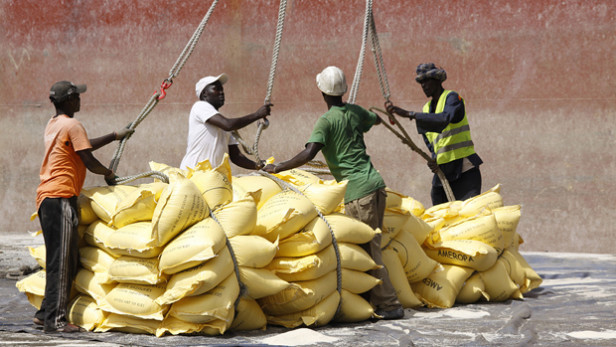 |
| Chinese rice imports at the port of Dakar, Senegal. China is exploring ways to feed its growing population using food grown in Africa. Photo by: vredeseilanden / CC BY-NC |
I wrote my first book analyzing the problems and challenges faced by Chinese rice projects in West Africa (Chinese Aid and African Development, 1998), so this is a special interest of mine. Here's what is going on in Senegal -- excerpted from an excellent analysis by Adama Wade at Financialafrik.com.
Senegal, with 13 million inhabitants, is the world’s tenth biggest importer with 700,000 to 900,000 tonnes per year. ... « It is strange that the rice produced in central Vietnam, transported to Ho Chi Min Port, loaded in bulk and shipped to the ports of Abidjan or Dakar, landed and then transported by road to Bobo Dioulasso or St. Louis is preferred by the population and is cheaper than local rice», wonders aloud an operator, formerly shareholder of Glencore International. ... Local production accounts for 200,000 tonnes of paddy rice, the equivalent of 140,000 tonnes of local rice. The Government’s goal is to reach 1 million tonnes by 2015, including 800,000 tonnes produced through irrigated rice. The Senegalese Government has made food self-sufficiency its key priority. But, there are still some inconsistencies. More tax incentives are given to investors who make 80% of their turnover from exports. Amazing! This is just the tip of the iceberg- while Asian producers receive subsidies on energy, water and fertilizers, in the Senegal River Valley, support mechanisms remain elusive. So, there are no energy subsidies for rice production and development (offset). Urea, which was subsidised by 50% between 2006 and 2011 and sold at CFAF 6,000 now costs CFAF 9,000. Although the price of DAP actually decreased, the quantity available barely covers half of the requirements. There is an energy challenge in the processing of local rice.«There are fixed monthly electricity costs. Whether you work or not, you pay CFAF 250,000 a month.» Under such conditions, can local rice sold at CFA 12,500 mill price (12,500 for whole grain rice) be competitive and generate enough income for a quantitative and qualitative leap?Adama's analysis makes it clear why the Chinese are not likely to be coming to Senegal for their rice. When it comes to that -- if it does -- they will go to Vietnam. Just as the Senegalese do.


7 comments:
Dear Professor Bräutigam,
I just want to thank you for your excellent works on Sino-African relations. I am working on my thesis in which I will try to explain the impact of China's presence on African human rights, both the positive and negative one. Your works helped me a lot to understand some concepts on which I have little knowledge. And your "pro-Chinese" position is really helpful for my work as there are really few researchers willing to write the good side of China.
Sometimes I found ironic because although people in the Western countries have freedom of information, they still do not know how the China is. They have the freedom to access to information, but they have little choice relating China. I mean, a great part of news that I found in Europe about China are negative. Really sad.
Thank you.
Ling
Thanks Ling. I continue to be amazed sometimes by the misinformation circulating on China's role in Africa. Let me add that I don't consider myself "pro-Chinese" but rather "pro-evidence". In The Dragon's Gift, I wrote about a lot of the problems with the China-Africa relationship. But if we are going to be critical, let's be critical about real problems (like buying illegal ivory or rhino horn, or illegal logging). I write about things like this on the blog and in my work.
That illegal logging part might be related to Chinese - but not from China
I have contacts who know someone from Malaysia - a big timber tycoon from North Borneo - who have had many involvement in illegal logging in Fiji, Africa and South America
Yes, that guy is an ethnic Chinese, but he is not from China
China Tobacco does purchase a lot of leaf from growers in Zimbabwe, Zambia, and Malawi.
Yes, tobacco is a large part of African agricultural exports to China. Cotton is also very big.
Is tobacco leaf going to get a chapter in your book? China's support for tobacco farmers in Zimbabwe and the sector's complete revival might be the most interesting story in Sino-African agriculture.
Tobacco won't get an entire chapter -- but Tian Ze's investment in tobacco contract farming is definitely discussed.
Post a Comment